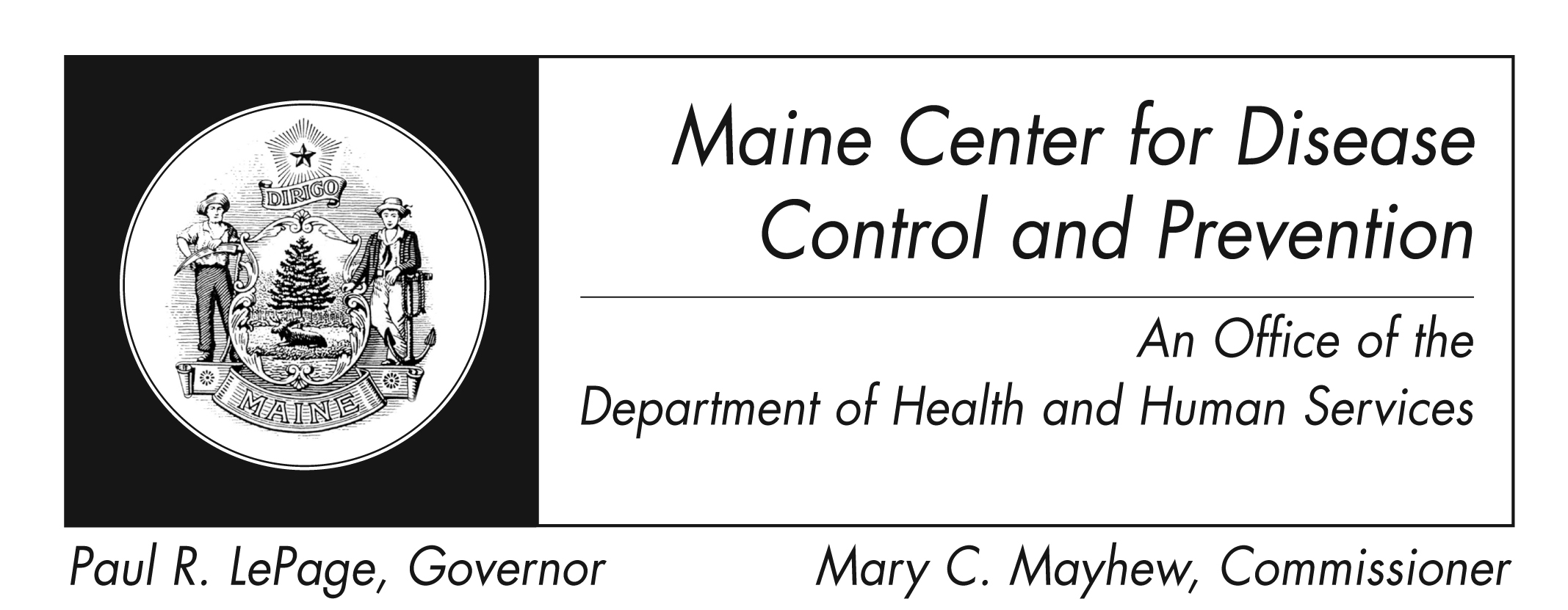M ETHICILLINRESISTANT STAPHYLOCOCCUS AUREUS (MRSA) FACT SHEET WHAT IS
M ETHICILLINRESISTANT STAPHYLOCOCCUS AUREUS (MRSA) FACT SHEET WHAT ISMETHICILLINRESISTANT STAPHYLOCCUS AUREUS INFECTIONS INTRODUCTION METHICILLINRESISTANT STAPHYLOCOCCUS AUREUS (AKA
Maine Bureau of Health
M ethicillin-Resistant
ethicillin-Resistant
Staphylococcus aureus (MRSA)
Fact Sheet

What is Staphylococcus aureus?
Staphylococcus aureus, also known as "staph," are bacteria. They are sometimes found on the skin or in the nose of healthy people who may not know they are carrying them and do not feel sick; this is called colonization. Sometimes these bacteria can cause infections, such as skin infections. Staph bacteria can cause more serious illness if they get into the bloodstream, the lungs, or a wound after surgery.
What is MRSA?
It is a type of staph bacteria that is resistant to certain antibiotics. This resistance can make infections harder to treat due to fewer treatment options.
How is MRSA spread?
Direct skin contact with another person or contact with items that have touched infected skin can spread staph, including MRSA. For example, sharing towels or athletic equipment can spread these bacteria. Fluid from staph infections such as boils is especially infectious.
What are the signs and symptoms of MRSA?
Staph bacteria, including MRSA, can cause skin infections. These infections may look like a pimple or boil. The area may also appear red, swollen, painful, or have pus or other drainage. Staph bacteria can also cause more serious infections such as lung, bloodstream, or wound infections after surgery.
How are MRSA infections treated?
Treatment for skin infections may include draining the boil. Antibiotics are not always necessary. If you receive antibiotics, take them exactly as your provider has instructed. If other people you know get the same infection, tell them to go to their healthcare provider.
Is it possible for a staph or MRSA skin infection to come back after it is cured?
Yes, staph or MRSA skin infections can come back after healing. To prevent this from happening, follow your healthcare provider’s directions while you have an infection and the prevention steps after the infection has healed.
What should I do if I think I have a MRSA infection?
Keep the area clean and dry. See your healthcare provider, especially if the infection is large, painful, warm to the touch, or does not heal by itself.
How will my healthcare provider know if I have a MRSA infection?
You usually will not receive testing for MRSA unless you have an active infection. If you have a skin infection, your healthcare provider may sample the area to find out what is causing the infection. A lab test will see which antibiotic would be best for you.
Does MRSA cause more serious infections than other staph?
MRSA does not usually cause more serious infections than other staph. However, MRSA infections can become severe if they are not properly treated.
How can I prevent staph or MRSA skin infections?
Practice good hygiene:
Wash your hands with soap and water or use an alcohol-based hand sanitizer.
Clean and cover cuts and scrapes with a bandage until healed.
Avoid contact with other people’s wounds or bandages.
Avoid sharing personal items such as towels or razors.
Get care early if you think you may have an infection.
How common are staph and MRSA infections?
Staph bacteria are one of the most common causes of skin infection in the United States. Many MRSA infections happen among patients in hospitals or other healthcare settings. However, MRSA infections are becoming more common in the community. About 33% of the population is colonized with staph and 2% is colonized with MRSA.
Are certain people at increased risk for community-associated MRSA infections?
MRSA infection risk increases when a person is in activities or places that involve:
Crowding
Skin-to-skin contact
Shared equipment or supplies
High-risk groups include:
Athletes
Daycare and school students
Military personnel in barracks
Individuals who recently received inpatient medical care
If I have a staph, or MRSA skin infection, what can I do to prevent others from getting infected?
You can prevent spreading infections to others by following these steps:
Keep wounds that are draining or have pus covered with clean, dry bandages. Follow your healthcare provider’s instructions on proper care of the wound. Pus from infected wounds can contain staph and MRSA. You can throw away bandages or tape with the regular trash.
You and anyone you are in close contact with should wash their hands often with soap and warm water or use an alcohol-based hand sanitizer. This is especially important after changing the bandage or touching the infected wound.
Do not share personal items such as towels, washcloths, razors, clothing, or uniforms. Wash sheets, towels, and clothes that become soiled with water and laundry detergent. Drying clothes in a hot dryer, rather than air-drying, helps kill bacteria on clothes.
Avoid contact sports and other skin-to-skin contact until your infection has healed.
Skin infections should be evaluated by a healthcare provider for testing and treatment.
Talk to your healthcare provider. Tell any healthcare providers who treat you that you have or had a staph or MRSA skin infection.
What about exclusions or school closure?
Maine CDC does not recommend school closure when a student or staff member has a MRSA infection.
Restrictions from work, school, or participation in school sports programs should only be considered if wound drainage cannot be covered and contained with a clean, dry bandage and for those who cannot maintain good hygiene practices.
Food service workers with draining lesions that cannot be properly contained should not work as food handlers or cooks until lesions are healed, per Maine Food Code 2013.
Where can I get more information?
For more information contact your healthcare provider or local health center. You can also contact the Maine Center for Disease Control and Prevention by calling 1-800-821-5821 or visiting the website http://www.maine.gov/dhhs/mecdc/. The federal Centers for Disease Control and Prevention website - http://www.cdc.gov – is another excellent source of health information.
Updated 12/2017
Tags: (mrsa) fact, ethicillinresistant, (mrsa), sheet, aureus, staphylococcus
- MULTICOLUMN WATER TANK CONSTRUCTION SPECIFICATIONS TANK CONTRACTOR PHOENIX FABRICATORS
- 71 D ROZUMIENIE I WYRAŻANIE W JĘZYKU RELACJI CZASOWYCH
- PROGRAMAZIO DIDAKTIKOA – MUSIKA – LMH BIGARREN ZIKLOA EUSKADI
- 2 ABSTRAK VISTYANINGRUM SEPTA REGINA 2010 ANALISIS KRIMINOLOGI TERHADAP
- DO NOT USE HEADER OR FOOTER MANUSCRIPT SHOWING STYLE
- GUIDES OF GOOD PRACTICE ORGANISING COMMONERS ASSOCIATIONS
- ORIENTACYJNE KRYTERIA OCENY SPRAWOZDANIA ĆW 61 MAX STUDENT PRAWIDŁOWE
- NOTIFICACIÓN DE CONDUCTA CONTRARIA A LA CONVIVENCIA PARA SU
- E NCUESTA DE SATISFACCIÓN DEL EVALUADOR CURSO 2020 SEÑALE
- SOLICITUD DE CÉDULA DE HABITABILIDAD PRIMERA SOLICITUD EN VIVIENDAS
- ФОРМА 11 СПИСОК НАУКОВИХ ТА НАВЧАЛЬНОМЕТОДИЧНИХ ПРАЦЬ ШАДРІНОЇ ГАЛИНИ
- RUTAS DE TRANSPORTE E PARADAS RUTA A MASIDE –
- SÉJOUR À LONDRES – MARS 2004 LE GROUPE DE
- CERTIFICACIÓN Y AUTODECLARACIÓN DEL EMPRESARIO NOMBRE EMPRESARIO REPRESENTANTE EMPRESA
- UNIVERSIDAD DE PUERTO RICO RECINTO DE RÍO PIEDRAS FACULTAD
- ROBERT KRAUSE WHOSE MOUSE ARE YOU? WHOSE MOUSE ARE
- GEMS ALUMNI ACHIEVEMENT AWARD NOMINATION FORM PURPOSE 1 TO
- ESPECIALIDAD EXCURSIONISMO REQUISITOS Y RESPUESTAS 1 DISCUTE CON
- ALBERTO COELLO SERVICIOS CON POSICIONAMIENTOS DIFERENTES SUPERMAXI Y MI
- ANALYSIS OF CREEP DATA FROM INDIRECT TENSION TEST ON
- SPECIES FACT SHEET COMMON NAME RUSTSTAINED PIN LICHEN
- IMPRESIÓN DE VOLANTES CANTIDAD 500000 ESPECIFICACIONES MINIMAS REQUERIDAS ESPECIFICACIONES
- 108 EGLIN PARKWAY SE FORT WALTON BEACH FL 32548
- SOLICITA FOTOCOPIAS DEL EXPEDIENTE SEÑOR JUEZ LG POR DERECHO
- UNITAT RADIOLOGÍA INTERVENCIONISTA UDIAT HOSPITAL SABADELL INFORMACIÓN PARA PACIENTES
- CLIMATIC VARIABILITY IN PRINCESS ELIZABETH LAND (EAST ANTARCTICA) OVER
- MUNICIPI SECTOR LLANÇÀ CANYELLES (CAP RAS) CADAQUÉS ELS ARRELS
- WAYS OF KNOWING PHILOSOPHY 2200 (MONDAY AND
- CLASSIFICATION CLASSIFICATION IS ONE OF THE MOST CONTROVERSIAL ISSUES
- BU DOKÜMAN TIMES NEW ROMAN (12 PT) YAZI STILI
SAEZ GONZÁLEZ JULIA DEL CARMEN C ASTRADA ARMANDO VALENTÍN
CRIMINAL TRESPASS UNLICENSED ENTRY OF CERTAIN AIRPORT AREAS (NJSA
 EL PRÓXIMO DOMINGO 19 DE FEBRERO SE REALIZARÁ UNA
EL PRÓXIMO DOMINGO 19 DE FEBRERO SE REALIZARÁ UNAAMALFIKYSTEN CAPRI POMPEI & VESUV MED DANSK
 KRAJSKÝ ÚŘAD – JIHOČESKÝ KRAJ ODBOR ŽIVOTNÍHO PROSTŘEDÍ ZEMĚDĚLSTVÍ
KRAJSKÝ ÚŘAD – JIHOČESKÝ KRAJ ODBOR ŽIVOTNÍHO PROSTŘEDÍ ZEMĚDĚLSTVÍ HOJA DE SOLICITUD PLAN DE EDUCACIÓN NO FORMAL 2016
HOJA DE SOLICITUD PLAN DE EDUCACIÓN NO FORMAL 2016 30 PEDOMAN PENULISAN SKRIPSI FAKULTAS TEKNIK DAN ILMU KELAUTAN
30 PEDOMAN PENULISAN SKRIPSI FAKULTAS TEKNIK DAN ILMU KELAUTANCOMPARING THE EFFECTS OF AND THE RESPONSES TO EARTHQUAKES
ANETA BOŁDYREW JOANNA SOSNOWSKA WYDZIAŁ NAUK O WYCHOWANIU UNIWERSYTET
SAMPLE ENCUESTA DEL IDIOMA USADO EN EL HOGAR IDIOMA
 JUNTA GENERAL DE SOCIOS DE LA SGR DE LA
JUNTA GENERAL DE SOCIOS DE LA SGR DE LAUPUTA O NAČINU PROVOĐENJA ODLUKE O KRITERIJIMA I NAČINU
 TECHNICAL SPECIFICATIONS UPDATED 73004 THE BLANCHE M TOUHILL PERFORMING
TECHNICAL SPECIFICATIONS UPDATED 73004 THE BLANCHE M TOUHILL PERFORMINGNATURAL RESOURCES CODE TITLE 3 OIL AND GAS SUBTITLE
 ATTACHMENT 2 ACP WGF11 – WP1 INTERNATIONAL CIVIL AVIATION
ATTACHMENT 2 ACP WGF11 – WP1 INTERNATIONAL CIVIL AVIATION VICTORIA DE STEFANO LLUVIA EDITORIAL CANDAYA CANDAYA NARRATIVA 5
VICTORIA DE STEFANO LLUVIA EDITORIAL CANDAYA CANDAYA NARRATIVA 5¿QUÉ ES LA AYUDA PARA EL COMERCIO? PATRICIA FRANCIS
MICHAEL KEREN CV PRESENT POSITION FULL PROFESSOR AND DEAN
JOSÉ MARÍA TORRES JOSÉ MARÍA TORRES ERA ESPAÑOL NACIÓ
PRAKTICKÉ INFORMACE K NÁRODNÍ KONFERENCI S MEZINÁRODNÍ ÚČASTÍ